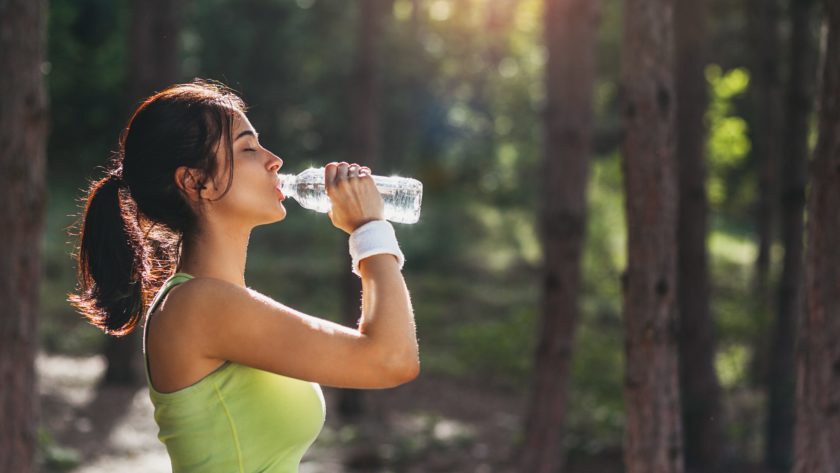When you’re working out, sweaty and thirsty, you’re likely to think about drinking some water. But it’s just as important to think about it BEFORE you work out and here’s why.
Exercise and Water Basics
When exercising, your muscles contract and generate internal heat. To prevent overheating, the heat must be promptly dissipated via your body’s cooling mechanism (sweating). Sweat cools the surface of the skin and decreases your body temperature.
Maintaining good hydration levels during exercise is critical to regulating body temperature (thermoregulation) and regulating blood pressure. When you’re dehydrated, your body’s mechanism to get rid of heat shuts down which can result in heat exhaustion or worse yet, heat stroke.
Neuromuscular Activity
By keeping your body adequately hydrated, you can perform at your optimal level. Without adequate water, your neuromuscular activity slows down which affects how fast and how hard your muscles can contract. As a result, you can experience a loss of strength, reduced endurance and/or slower reaction and response times.
Why Pre-Hydrate
Never begin exercising if you’re thirsty. Consuming adequate fluid prior to your workout will improve your athletic performance by increasing your body’s physiological response to exercise. However, if you overcompensate by drinking copious amounts of fluid and/or drink too close to your competition or workout time, frequent trips to the restroom can disrupt your workout as well as your electrolyte balance.
How Much Fluid
Two to four hours before a workout, drink 5-7 ml of fluid per kg body weight. So, if you weigh 130 lbs. (59 kg), you should drink 295- 414 ml (about 10-14 oz). Simply put, the average size person should drink about 1.5 to 2 cups pre-exercise. By doing so, you’ll allow time for your kidneys to process the fluid and excrete any excess. Then drink a little more 5 to 15 minutes before training.
Hyperhydration
Drinking too much fluid can cause your extra- and intracellular spaces to expand. Studies show there is no clear physiological or performance advantage over a normal state of hydration. Excessive fluid intake can result in hyponatremia, also known as water intoxication, and is more common in marathons or other prolonged activities. In this condition, sodium levels in the blood become dangerously diluted and can be fatal.
Hyponatremia signs and symptoms may include:
- Nausea and vomiting
- Headache
- Confusion
- Loss of energy and fatigue
- Restlessness and irritability
- Muscle weakness, spasms or cramps
- Seizures
- Coma
![]() Karen’s Fit Tip: A good way to monitor whether you’re adequately hydrated is by checking your urine color. It should be light yellow (like lemonade). If your urine is a dark yellow (think apple juice), drink an additional 1 to 1 1/2 cups of fluid.
Karen’s Fit Tip: A good way to monitor whether you’re adequately hydrated is by checking your urine color. It should be light yellow (like lemonade). If your urine is a dark yellow (think apple juice), drink an additional 1 to 1 1/2 cups of fluid.


